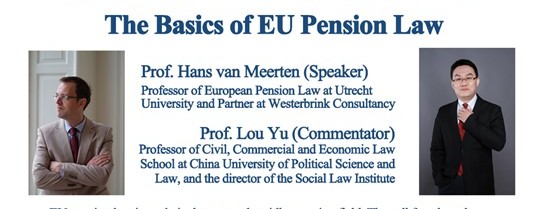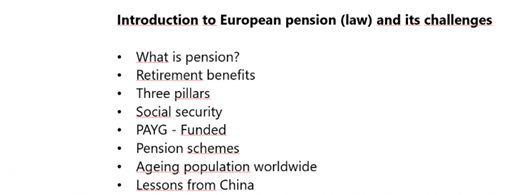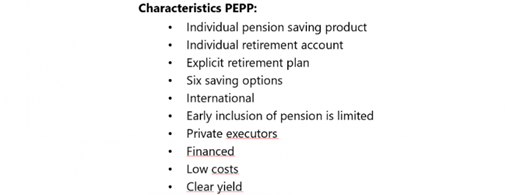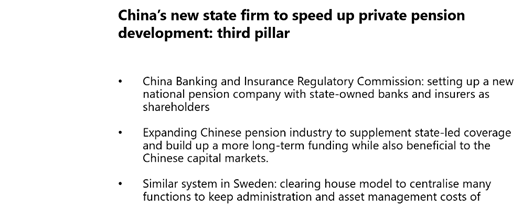On April 26, 2021, approximately 120 students from the China-EU School of Law attended a special lecture on the fascinating topic of “The Basics of EU Pension Law”. This was the second session of the International Legal Lecture Series in the Master of European and International Law elective module. The lecture was given by Professor Hans van Meerten through Tencent Conference, and Professor Lou Yu served as a co-speaker and commentator. Professor Monty Silley was the host of the lecture.

Professor Hans van Meerten is a Professor of European Pension Law at Utrecht University. He formerly worked for Clifford Chance, and now is an independent lawyer. He is also a partner of Westerbrink Consultancy. Professor Lou Yu is a professor of Civil, Commercial and Economic Law School of China University of Political Science and Law, and the director of the Social Law Institute.

The main content of this lecture was divided into three parts. The first part was an overview of pensions, focusing on the three pillars, the difference between pay-as-you-go (PAYG) systems and funded systems, as well as different forms of pension schemes. The second part introduced the European pension legislation, which focuses on the IORP Directive, the Personal European Pension Plan (PEPP) and the European approach to an ageing population, namely the Capital Markets Union. The third part introduced the Chinese approach to an ageing population.

In the first part, Professor Hans van Meerten focused on the concept of pensions. First, he introduced the basic EU legislation system and the free movement provisions to help students understand the context of European pension legislation. Later, he explained the three pillars of pensions in detail. The first pillar is social security schemes, the second pillar is occupational schemes, and the third pillar is individual schemes. In terms of social security, he noted that the state pension is often a PAYG system, which means workers paying for retirees. The first pillar is under pressure as the number of retirees grows. Then, he introduced the differences between PAYG systems and funded systems, in whether there exists a capital reserve to invest. He also provided an overview of two different pension schemes, that is defined benefit schemes and defined contribution schemes. After that, he pointed out that the Dutch pension fund is the biggest in the EU, and that around 90% of employees participate in a pension fund, since such participation is usually compulsory.

In the second part, Professor Hans van Meerten dealt with the IORP Directive, which is an effort made at the EU level to solve the problems of an aging population. However, due to the vague concept, the IORP Directive does not work perfectly. Next, the professor mentioned the Personal European Pension Plan (PEPP). He introduced the characteristics, operation, objectives and market of PEPP in detail.

In the third part, Professor Hans van Meerten briefly introduced the Chinese approach to dealing with the aging population. He pointed out that China’s new state firms are accelerating the promotion of private pensions, which he sees as the development of the third pillar. Finally, he points out that “all people under the heaven are of one family and all nations should live in harmony” when concluding that we can and should learn from each other going forward.
After Professor Hans van Meerten’s presentation, Professor Lou Yu made extensive comments. He pointed out that Professor Hans van Meerten had discussed the most important legal factors of the pension systems and further reviewed the Chinese pension, legal system and the third pillar. On this basis, Professor Lou Yu put forward his own views, arguing that in a PAYG system each generation has responsibilities both to its own and to the next generation. Additionally, he pointed out that China’s pension payment system has borrowed from the EU’s practice of payment and calculation in different countries.
Finally, Professor Lou Yu asked Professor van Meerten a number of thought-provoking questions. He was curious, first of all, about the specific work content of European pension lawyers. In his answer, Professor Hans van Meerten pointed out that his main work content was to help companies solve the pension problems of their workers, specifically, to strategically plan pension schemes and give corresponding consulting advice. Professor Lou Yu also asked specific questions about how pensions were structured in Netherlands, Germany and other European jurisdictions, which Prof van Meerten gave detailed answers to.
In the Q&A session, students also asked questions about how the pension system covered individual contractors and the differences between urban and rural pension systems in China. Professor Hans van Meerten and Professor Lou Yu answered the questions thoroughly. It was identified that both Europe and China face similar challenges in providing pension support to platform workers and independent contractors, as well as the self-employed. Finally, Professor Hans van Meerten and Professor Lou Yu sent their sincere wishes to all the students. This was the start of a wonderful cross-border collaboration between two leading scholars, and they look forward to continuing to share their knowledge and giving lectures together again in the future.
Original text written by: Mao Chenyang (Double master's student from 2019 intake)
